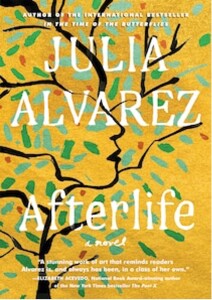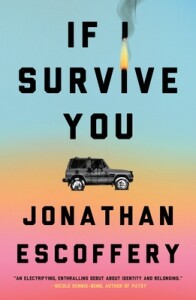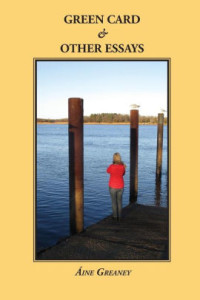
There are inflection points in our lives, moments when everything changes: What we thought of as our life now exists only as the past, and the future is about to begin. We meet Antonia Vega as she confronts such a moment.
A native of the Dominican Republic, Antonia came to the United States with her family and found herself teaching Americans about their own language and literary traditions. Now, not only has she retired from her work as a college professor, but her husband of over thirty years has died. “Who am I going to be anymore?” she wonders. As a woman with no profession, no husband, no children, she feels herself becoming invisible.
At the same time, she is haunted by words: those of her husband—a beloved doctor in their small Vermont town—and those of all the authors whose work she has read and taught over the years. She tells herself: “An afterlife? All she has come up with is that the only way not to let the people she loves die forever is to embody what she loved about them. Otherwise the world is indeed depleted.”
The world has not done with her, though. She becomes embroiled in the problems of an undocumented worker on the neighboring farm, whose fiancé is being held hostage in Colorado by coyotes who demand Mario send more money. At the same time, her older sister Izzy is behaving more and more erratically, and her other two sisters rope her into their schemes to force Izzy to get help. Then Izzy goes missing.
As both situations escalate, Antonia questions where her responsibility lies. Unlike her big-hearted, activist husband, she lacks the appetite for self-sacrifice that most women have had drummed into them. She turns to questions from a Tolstoy story she used to teach: “What is the best time to do things? Who is the most important one? What is the right thing to do?”
She reminds herself of the rampant individualism in her adopted country, that advises you to put on your own oxygen mask before attempting to help others. Yet she also conjures a saying her husband’s mother used when someone had a problem: “Let’s see what love can do.”
One of the aspects of this book that I most valued turned out to be these contradictions and how we manage to live with them. For example, the farmer next door (whom Mario works for) loudly complains about illegal immigrants, yet he secretly hires them because he can’t afford to pay the salary a citizen would expect.
The themes here fascinate me: the identity crisis caused by your world flipping over; the way women are taught to sacrifice their own needs and desires to those of others; the immigrant experience, not just in the first contact with the new culture, but what happens after a few decades of steeping in it. I was surprised by how much this short novel resonated with me. And of course I appreciated the Vermont setting.
I love all the lines from stories that swarm into Antonia’s thoughts, their sources mostly not identified. However, that can cause danger for the author, similar to the danger of using such a generous amount of Spanish, especially in the dialogue. As a former English teacher and devoted reader, I recognised most of the quotes and, though not knowing Spanish myself, I could figure out what was meant by the context. But that will not be true for everyone. One reader on Goodreads thought that these quotes were just the author trying to be a poetic and instead, sounding like “word salad.” Reasonable enough.
I haven’t yet mentioned my favorite part of the book: the four sisters. Every scene with them explodes with life and emotion and—oh, golly!—the dialogue! Alvarez so beautifully articulates the shifting dynamic between them: alliances forming and reforming, ancient injuries resurrected, fierce loyalties and unquestioned support. Most of all, a secret language that only those you’ve grown up with can understand.
Luckily, I consumed this story as an audiobook, masterfully narrated by Alma Cuervo. I enjoy physical books—I’d better, since they threaten to overwhelm my home—but there are times when an audiobook works better, at least for me.
While I seek out stories about people and cultures different from mine, I’m also interested in books about women and men in the later stages of life. There are many ways to define these stages: Shakespeare’s seven stages of man, Erik Erikson’s eight stages, Gail Sheehy’s Passages. Mostly I think about the four stages of life as described in ancient Hindu texts (the Student, the Householder, the Hermit, and the Wandering Ascetic).
Whatever stage of life you’re in, I recommend this 2020 novel by the author of In the Time of the Butterflies and How the García Girls Lost Their Accents.
What novel have you read that surprised you? How?


